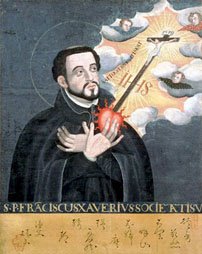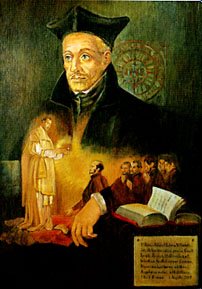The Year of the First Companions: Ignatius, Francis and Faver
 Companions in the Lord,
Companions in the Lord,Doing God's Work,
For the Hope of the World
The jubilee year officially begins 3 December, 2005 and celebrates the spirit of these founders of the Society of Jesus:
- Ignatius Loyola-died 31 July 1556 in Rome
- Francisco Javier-born 7 April 1506 at Javier in Navarre
- Pierre Favre-born 13 April 1506 in Villaret in Savoy
In these three first companions, we see personal symbols of the essential aspects of the "original spirituality" of the Society. As Jesuits and lay partners, we wish to celebrate this jubilee year by contemplating and appropriating the unique gifts of each of the companions, for our challenging time and Philippine context.
THE GIFTS OF THE FIRST COMPANIONS
 Ignatius Loyola and apostolic spirituality
Ignatius Loyola and apostolic spiritualityIgnatius' unique gift to the Society and the Church was an apostolic spirituality: a spirituality of labor with God, in God's labor in the world. Ignatius had a mystical vision of a Trinitarian God at work in the world for the salvation of humanity. Christ is not so much a great figure of the past, but a living Lord, inviting men and women today to labor with him in his ongoing struggles against "the enemy of human nature" (Exx 136), in his ongoing project of filling the world with "knowledge of the true life" (Exx 139). Thus, for Ignatius, it was "not sufficient... to do some work for God." "Ignatius wishes to insert himself into the very work of God." (Hans Kolvenbach, Superior General of the Society of Jesus)
 Francis Xavier and mission
Francis Xavier and missionFrancis Xavier, "a man of intense missionary activity, stops at nothing to proclaim the good news." (Kolvenbach) If Ignatius reminds us that it is God's work we participate in, Xavier symbolizes the human response to God's invitation. In Xavier, we see the passionate sense of urgency and the total giving of onself in gratuity to the work of evangelization. We see in him that burning desire to "help souls," precisely because so many "are deprived of their proper humanity and are plunged into misery." (Kolvenbach)
 Pierre Favre and cura personalis
Pierre Favre and cura personalisPierre Favre embodied the dimension of cura personalis. "Not gifted for governance as was Ignatius or impelled toward great exploits as was Francis, Favre devoted himself to the spiritual companionship of a great number of people who were searching for God." (Kolvenbach) Reflecting the consoling ministry of the risen Christ, he accompanied people in a personal way, with delicacy, charity, kindness, "as friends are accustomed to console friends" (Exx 224).













<< Home